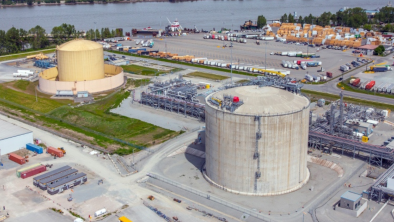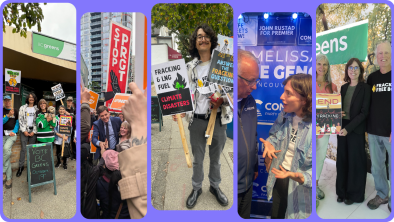Water usage by fracking operations challenged in B.C. Supreme Court

News Release - March 17, 2014
VANCOUVER — A lawsuit targeting water withdrawals by oil and gas companies in north-eastern British Columbia will be heard by the B.C. Supreme Court today.
Ecojustice lawyers, representing Sierra Club BC and the Wilderness Committee, will argue that the B.C. Oil and Gas Commission’s practice of repeatedly granting short-term water approvals to oil and gas companies is unlawful.
“If companies want long-term access to B.C.’s fresh water then they need to apply for a full water licence, not rely on repeated short-term approvals,” said Morgan Blakley, Ecojustice staff lawyer. “Our clients’ position is that the Commission is unlawfully allowing oil and gas companies to drain huge quantities of fresh water from lakes, rivers and streams in north-east B.C. by approving hundreds of repetitive short-term approvals.”
Encana Corporation, one of the province’s biggest natural gas producers, is also named in the suit.
Under B.C.’s Water Act, there is a two-year limit to short-term water approvals. Where a company wants long-term water rights, they are required to obtain a water licence. However, the Commission’s practice of repeatedly granting short-term approvals has allowed oil and gas companies to use water for longer than the two-year limit, in some cases for as long as five years, without getting a water licence.
Short-term water approvals granted by the Commission may also allow companies to draw much larger volumes of water per day — and per year — than their long-term water licences.
For example, the Commission granted Encana five short-term permits on Wasp Lake between 2007 and 2013, despite the fact that the company already held a water licence for the same lake. Just one of these short-term approvals allowed Encana to withdraw more water in three days than the entire amount granted by its water licence for a year.
According to evidence submitted to the Court, an Encana representative indicated to the Commission that the company applied for the short-term approval to “to ‘top up’ or increase the amount of water we could withdraw from Wasp Lake based on our water licence”.
“According to B.C.’s Water Act, short-term approvals are intended to permit water usage for short-term projects, like roadwork,” said Eoin Madden, climate campaigner with the Wilderness Committee. “They aren’t meant to give oil and gas companies a free pass to exploit B.C.’s fresh water resources. Long-term water use for purposes like fracking requires a full licence.”
The Commission can currently grant hundreds of approvals at a time, giving oil and gas companies access to freshwater resources with insufficient oversight. For instance, just one bulk authorization allows Encana to access more than 100 sites and withdraw enough water to fill more than 500 Olympic-sized swimming pools.
“Any proposed LNG project will require an increase in drilling and fracking operations in British Columbia’s north-east, where communities are already seeing fresh water depleted and contaminated,” said Caitlyn Vernon, campaigns director with Sierra Club BC.
“Rather than address the problem of poor water management, the proposed new Water Sustainability Act entrenches the practice of granting repeated short-term approvals in law, allowing oil and gas companies to suck lakes and rivers dry and contaminating watersheds, just as water is becoming increasingly scarce and precious due to climate change.”
B.C.’s new Water Sustainability Act
Last week, the B.C. government finally introduced the Water Sustainability Act. It appears that parts of the new Act specifically target the arguments we are raising in this case and may have the effect of legalizing the practice that we submit is currently unlawful.
What is fracking?
Fracking involves injecting large quantities of water, sand and chemicals at high pressure down wellbores. The pressurized mixture causes the rock layer to fracture and release the natural gas trapped in the formation. As part of the fracking process, significant quantities of contaminated wastewater typically flow back up wellbores afterward, requiring safe disposal.
The contamination of millions of cubic metres of water and emissions contributing to climate change are among the environmental impacts associated with fracking.
-30-
Images and b-roll:
- B-roll: https://vimeo.com/70898653 (Password = fr4ck1ng)
- Images: http://www.flickr.com/photos/108428534@N02/sets/72157637578914794/
For more information, please contact:
Morgan Blakley, staff lawyer | Ecojustice
604.685.5618 x288 | mblakley@ecojustice.ca
Eoin Madden, climate campaigner | Wilderness Committee
604.353.9603 | eoin@wildernesscommittee.org
Caitlyn Vernon, campaigns director | Sierra Club BC
250.896.3500 | caitlyn@sierraclub.bc.ca


